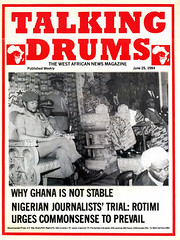Sports
Africans called to boycott sports with Britain
The Supreme Council for Sports in Africa has urged a wholesale boycott of British Athletes and sporting goods because of the British government's failure to prevent the English rugby tour of South Africa this month.At a meeting in the Upper Voltan Capital, Ouagadougou, the council's executive bureau dismissed the British Government's argument that it had no statutory power to stop the tour as evidence of its "unconcern and indifference", and said it clashed with the Gleneagles declaration by Commonwealth countries about avoiding sports contacts with "Racist South AFrica".
It also recalled the anti-apartheid resolution passed by the Supreme Council's 1979 General Assembly and asked its members "without further delay" to:
Boycott systematically all sports competitions throughout Britain."
Forbid British citizens to take part in sports competitions in Africa.
Ban British coaching engagements in Africa.
Boycott British sports goods.
Refuse to use British firms for the construction of sports facilities.
The executive mandated the Council's Secretary-General to ask the UN special committee against apartheid to organise an international conference in Africa to draw up a con certed plan to outlaw racial discrimina tion in sport.
The participants agreed to ask the Ethiopian leader, Mengistu Haile Mariam, as current chairman of the Organisation of African Unit, to consult fellow OAU Heads of State about what approach to adopt towards the Los Angeles Olympic Games.
Garba condemns links with S. Africa
The chairman of the UN special committee for action against apartheid, retired Major-General Joseph Garba, of Nigeria has con demned those governments and sports organisation that have continued to associate with apartheid South Africa. He said that such actions would not halt the campaign for the isolation of the racist regime. In an opening address to a special meeting of the committee to examine the effectiveness of the international sports boycott of apartheid South Africa, Major-General Garba said, "there is no doubt that these developments do cause us concern but the struggle has to go on".The chairman, who is also Nigeria's permanent representative to the UN, hinted that with some governments and sports organisations violating the boycott, the time had come for the anit-apartheid committee to device new strategies to check further violation of the campaign.
Major-General Garba, however, praised those governments, sports organisations and individual sportsmen and women who had, despite monetary offers, refused to participate in sporting activities with their counterparts from apartheid South Africa.
Agent of apartheid
Zola Budd, the teenage South African athlete recently granted British citizenship has been called an 'agent of apartheid' at a special meeting of the committee to examine the effectiveness of sports boycott of South Africa, by the chairman of the South African non-racial Olympic committee, Mr Sam Ramsamy. According to Mr Ramsamy, South Africa is manoeuvring to infiltrate the Olympic Games under 'flags of convenience'.Budd, 18, has earned a place in Britain's Olympic squad.
Chief Abraham Ordia of Nigeria, the honorary President of the Supreme Council for Sport in Africa, said at the meeting that the Budd case was a pointer of things to come.
AU has not called for boycott
The honorary President of the Supreme Council for Sports in Africa, Chief Abraham Ordia has said in New York that most African countries would not boycott the Los Angeles Olympic Games because there had been no directive to that effect from the OAU.Chief Ordia told the New York correspondent of the News Agency of Nigeria (NAN) that when in 1979, all OAU member-states, excluding Senegal and Ivory Coast, boycotted the Montreal Olympic Games, it was in keeping with the decision of the OAU Asked why many African countries would want to participate in the Los Angeles Games, despite a recent playing tour of apartheid South Africa by an English Rugby Team, Chief Ordia replied, "the rugby team tour of apartheid South Africa is purely a Commonwealth problem and has nothing to do with the Olympics".
Chief Ordia stated that the effect of the rugby tour would be felt at the next Commonwealth Games in Edinburgh, Scotland, in 1986.
Chief Ordia was in New York, together with some other sports leaders in Africa, for a special meeting of the UN anti-apartheid committee to examine how effective the sports boycott of apartheid South Africa had been.
Odizor depressed
Tennis star, Nduka Odizor, has said in London that he is depressed by the furore over his participation in a tournament in which South African Daniel Vosser took part.In a press release captioned "I am not unpatriotic" made available to the News Agency of Nigeria in Lagos, Odizor said:
"I still have not received the letter by Joe Garba expressing anger at my wrongdoing." Odizor explained that "the International Tennis Federation has its clear-cut policy on South Africa and its apartheid government. That is why South Africa was expelled from the Davis Cup which is the supreme tournament between nations and that is why no Grand Prix tournament is approved for South Africa.'
According to Odizor, "the International Tennis Federation ban does not extend to South African-born players who are resident elsewhere and play as individuals."
Odizor said: "I identify with the humane cause championed by my country. That is why I have refused very lucrative offers from South Africa especially after my performance in Wimbledon last year".
